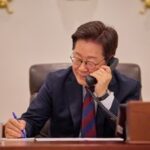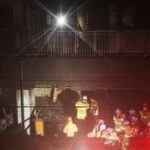Medical Crisis in South Korea: Over 6,000 Residents Resign Amid Quota Expansion Protest
wikitree Views
The number of residents resigning exceeds 6,000 on the 20th
Many walked off their duty at Severance Hospital and Seoul St. Mary’s Hospital

Medical staff are moving in front of the outpatient clinic at Jeonbuk National University Hospital in Jeonju, Jeollabuk-do, on the 20th, when residents stopped working due to a group resignation in protest of the government’s expansion of medical school quotas. / News1
As of the 20th, the number of residents who resigned in protest of the government’s expansion of medical school quotas exceeded 6,000.
The Ministry of Health and Welfare inspected 100 major training hospitals nationwide, where about 95% of the total 13,000 residents are working as of 11 pm on the 19th.
As a result, it was revealed that 6,415 residents, equivalent to 55% of residents at these hospitals, submitted their resignations, and 1,630, equivalent to 25% of those who submitted their resignations, did not show up for work and left their workplaces.
Park Min Soo, the Second Vice Minister of Health and Welfare, announced these results at a briefing of the “Central Accident Response Headquarters for Collective Doctor Action” on the same day, saying, “Severance Hospital and Seoul St. Mary’s Hospital had relatively more collective actions, and in the rest of the hospitals, there were either no or few cases of leaving.”

The Ministry of Health and Welfare conducted on-site inspections at the top 10 training hospitals with the most residents the day before. In these hospitals, 1,091 submitted their resignations, and 757 did not show up for work.
The Ministry issued a new work commencement order for 728 of them. Including the 103 who had already been ordered, 831 have been issued a work commencement order so far.
The Ministry of Health and Welfare plans to conduct new on-site inspections at 50 hospitals on the same day and issue additional work commencement orders to residents who have been away from their workplaces for a long time.
They can be subject to administrative measures such as license suspension if they do not return to work despite the work commencement order.

Vice Minister Park also announced the cases of damage consultation received at the “Doctor Collective Action Damage Report and Support Center” on the same day.
As of 6 pm on the 19th, there were 34 cases of damage consultation, including 25 cases of surgery cancellations, 4 of medical appointment cancellations, 3 of treatment rejections, and 2 of delayed hospitalization.
Vice Minister Park said, “There was a heartbreaking case where a guardian had taken a leave of absence from his company for his child’s surgery scheduled a year ago, but hospitalization was suddenly delayed,” and explained, “There were also cases where we linked to the Korea Legal Aid Corporation for legal service support at the request of the person concerned.”
In reality, the scale of the damage is estimated to be larger as Severance Hospital decided to cut the operation of its operating rooms by half this week. The medical service gap crisis is gradually becoming a reality.

Vice Minister Park said, “There have been large-scale strikes whenever there were attempts to separate medicine and pharmacy, remote medical treatment, and increase medical school quotas,” and added, “Each time, patients suffered and faced difficulties, and the government had no choice but to listen to the demands of the medical community. I think we should no longer repeat this history.”
He said, “I hope the residents will return to the patients,” and added, “It is absolutely wrong to endanger the lives of patients to express your intentions.”















Most Commented